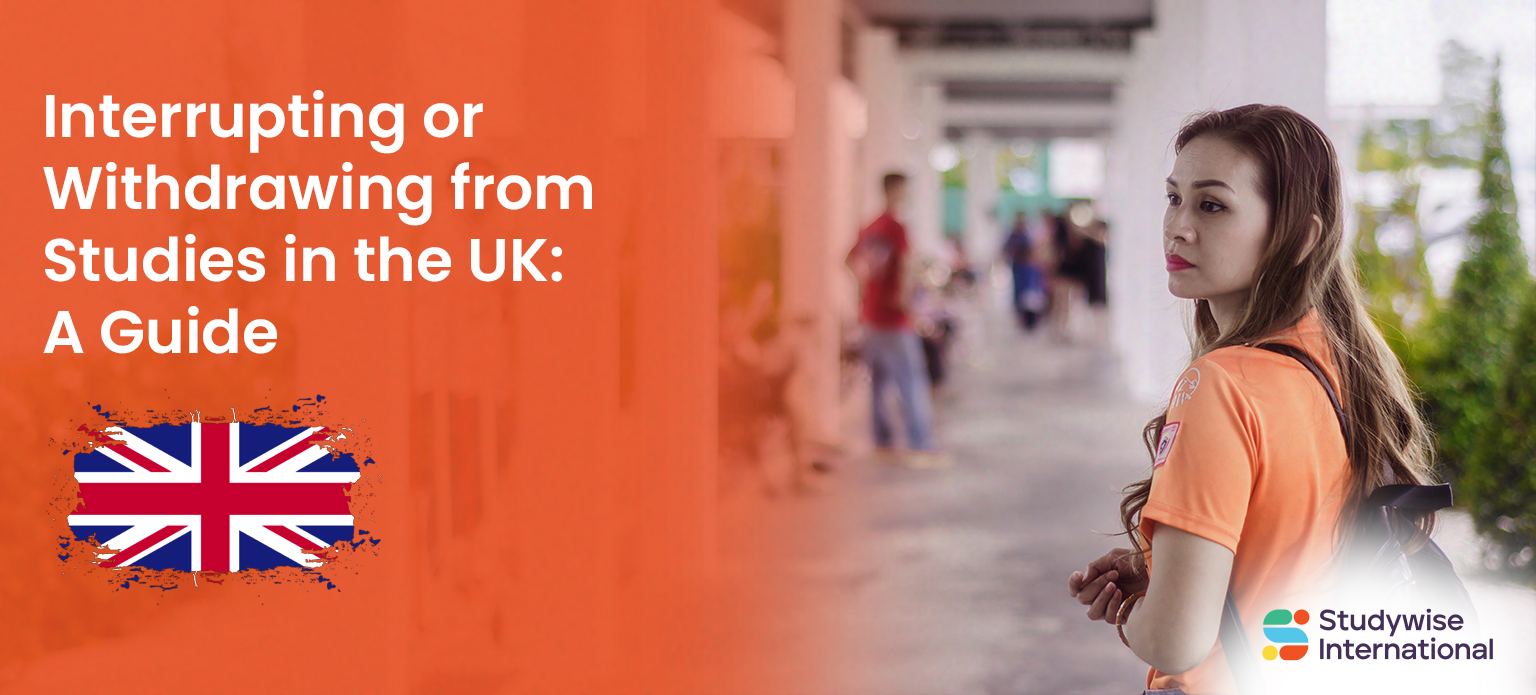
Interrupting or Withdrawing from Studies in the UK: A Guide
- Categories All Study in Abroad Blogs, Study in the UK
- Date July 16, 2024
There could be various reasons for students to interrupt their ongoing courses in the UK. In fact, it is common for 1st year students to reconsider their course after experiencing it first-hand. You could change your mind about the course and desire an upgrade. You could be struggling to keep up with the academic pressure either because it doesn’t challenge you or does too much. Sometimes, the distance from your family and friends is overpowering. And in some cases, it is a fast-paced and extensive lifestyle. Whatever your reason, you can interrupt, withdraw or change your course and university in the UK.
Interrupting the course works like a pause. You can return to your studies after some time as long as you do so before the faculty and university-approved date. Whereas, withdrawal means terminating your studies and moving out. You can transfer to a different university or return to your homeland. Students can do that when they have absolutely neither the intention nor wiggle room available for their return. Before taking any further steps, consider reasoning with family, friends, a personal tutor or a career advisor. They will help draw more light to your interests as an outside viewer and help you decide wisely.
In this blog, we will delve into how to go about your student visa as well as the repercussions you must prepare to face under different scenarios.
Dropping the Course
You can drop the course at any point in its duration. However, you must not stop attending the classes, take part in university events or withdraw yourself from any of its experiences. Once you have made up your mind, consult with the student support officers or your study abroad consultant. They will help you map out a career plan according to your stage of learning, course completion and university guidelines. If you are unsure, take a step back and reevaluate your decisions. The university may have a pre-sessional course or foundation course to help you cope up better. Once you drop the course, there is no going back.
To go ahead with the process, speak to your personal tutor and obtain the necessary documents. While you may not be under any legal obligation to continue the course, you are to update the university. As a matter of fact, it is necessary to understand the legal and financial implications of your steps. File out the withdrawal form to schedule an official leaving date. If you are leaving in the 2nd or 3rd of your course, check with your department if there is a possibility of you attaining a certification or diploma. Notably, you may be required to take an exam for the same. Most importantly, update the same in the immigration office of your study destination. They will further help you understand the financial implications of your step deeper.
Also read: 6 Benefits of Taking a Pre-sessional English Course
Taking One Year off
Unlike dropping the course, taking a year off is not something you can decide on your own. You will need to meet your personal tutor and get their permission to take this pause. As long as you have a genuine reason, you will get the go-ahead. It could the academic stress, physical and mental health issues, homesickness or financial inability pulling you down. The year gap could be the break you need to get back on your feet. Apart from the personal tutor, you must also inform your department and immigration officers to understand the academic and financial implications. Continue attending your classes and other activities till you get approval on your application or, well till you can. As you do plan on getting back, you don’t want to miss out on things and feel out of the loop.
When the time of return approaches, the university will guide you through the process. If you plan to drop the course entirely, you may inform them. Otherwise, proceed with the process of getting a new CAS statement and number to start the visa process.
Also read: 6 Impacts of Studying Abroad on Career Prospects
Changing Course within the University
You can change courses within as well as outside the university. Doing so within the university would be rather easier as you must already be accustomed to it. However, it can only be done as long as you meet the criteria of the new course. When changing the university, you also need to meet the eligibility criteria of the desired university. Moreover, the course should have enough space for you. When planning to transfer to another course or university, make sure to understand what to expect before dropping what you have. Speak with both your and the new department faculties as well as students.
Changing courses within the university involves you filling out an internal transfer form generated by your current department. As long as all requirements are met, you will get a transfer. Changing universities, on the other hand, is more complicated than that. Your credits from the first university will determine if you can, in fact, continue the new course. Chances are you will have to undertake the university application from the start. This includes reapplying for the UCAS, taking an interview and joining the first-year batch. As soon as you get approval on either of these scenarios, contact the immigration office. Changing courses and universities have major financial impacts because of the course duration, tuition fee, living arrangements and other variables. The designated authorities will help you understand the new loan entitlements.
Read: Become Successful in Choosing Your Course and University
Cancellation of Your Student Visa
Your student visa will not be valid if you take an interruption or withdrawal from your studies. The university informs the immigration authorities of your leave within 10 working days. In effect, your visa will be cancelled in the next 60 days. Hence, as soon as you receive approval on your application, you must get back to your homeland. Most likely, the visa authority of the country will contact you to do so or send an email and letter on the subject. If you take a drop or transfer university, you will need a new visa to continue your studies in the UK. Genuine delays in joining are entertained but only for a reasonable amount of time. It is important to keep the immigration authorities informed of your plans to safeguard your immigration status.
Since you don’t own a student visa anymore, you cannot work in the UK either. Staying beyond the expiration or cancellation date alone is a violation. You will also need to drop your university accommodation, health insurance or part-time job till you acquire the new visa. Notably, you may be liable to pay a percentage or whole of your tuition fees. On a larger scope, your immigration status or employability doesn’t have any rigid impact.
Also read: Changing schools after getting the UK study visa
Managing Financial Sponsorship and Loans
Financially sponsored students need to consult with their sponsor in order to make any decision. A drop or interruption may label you ineligible of availing the funds or use them in the future. Regardless of your choice, you are responsible for any outstanding tuition fee, council tax, student loan or any other financial obligations. Make sure to clear all outstanding payments immediately to avoid any burden on your head. Similarly, if you take a loan, you need to inform the bank to stop or pause the funding. You will need the necessary documents to prove your interruption or withdrawal and further if and when continuing the course.
Make it easier. Talk to our experts at Studywise International for a FREE CONSULTATION today!
You may also like

Ireland Intake 2024-25: Universities & Preparation Timeline

TOEFL Scoring System and Validity


